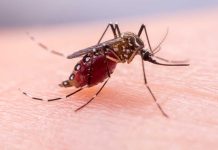
At a Glance
- 51 reports of Salmonella in 21 states linked to turtles with shells less than 4 inches.
- 48% of reported cases required hospitalization; no deaths reported.
- Federal law bans selling turtles with shells less than 4 inches, yet violations persist.
- Recommendations include stringent handwashing and avoiding the purchase of small turtles.
CDC Issues Salmonella Warning
The Centers for Disease Control and Prevention (CDC) has identified a Salmonella outbreak linked to small pet turtles, with infections reported in 21 states. The CDC warns that both direct and indirect contact with these small turtles can lead to infection. Symptoms typically include diarrhea, fever, and stomach cramps. Although the illness usually lasts 4 to 7 days and most people recover without specific medical treatment, severe cases, particularly in vulnerable populations, may require hospitalization.
The CDC has recorded 51 reports of Salmonella, with 48% of cases requiring hospitalization. Fortunately, there have been no reported fatalities linked to this outbreak. The affected demographic includes children under 5 years and adults over 65, highlighting the necessity for vigilant health practices around turtles. Symptoms manifest between 6 hours to 6 days after exposure and can be more severe in young children, the elderly, and those with weakened immune systems.
Federal Law and Continued Violations
A federal law bans the sale and distribution of turtles with shells less than 4 inches. This ban aims to prevent repeated illnesses and outbreaks. Despite this, some online retailers, pet stores, and roadside markets continue to sell these small turtles. The CDC recommends purchasing larger turtles, at least 4 inches in shell length, from reputable stores or rescues. It’s crucial to enforce these laws to protect public health.
Pet turtles of any size can carry Salmonella germs in their droppings, which can then spread to their bodies, tank water, and surrounding environments. Public health officials are actively investigating these multistate outbreaks. They have noted that 66% of interviewed patients had recent contact with small pet turtles. Bacteria samples from some turtles matched those found in infected owners, underscoring the health risks posed by these pets.
The CDC reports that an outbreak of Salmonella infections from small turtles has impacted 21 states and appears to be growing. https://t.co/FLiHgn8Do9
— Food Safety News (@foodsafetynews) August 20, 2024
Recommendations for Pet Owners
CDC guidelines stress the importance of rigorous hand hygiene after touching, feeding, or caring for turtles. It’s especially imperative to guide young children in proper handwashing techniques after any interaction with these pets. Avoid kissing, snuggling, or eating and drinking around turtles to reduce the risk of Salmonella transmission. Dedicated cleaning supplies should be used solely for turtle habitats.
If pet ownership becomes unmanageable, never release turtles into the wild. Instead, contact local pet stores or reptile rescues. Pet turtles are unsuitable for homes with children younger than 5 years, adults over 65 years, and individuals with weakened immune systems. Severe Salmonella symptoms requiring medical intervention include high fever, prolonged diarrhea, bloody diarrhea, excessive vomiting, and signs of dehydration.
Sources
CDC warns of another Salmonella outbreak linked to small pet turtles
Salmonella outbreak caused by tiny turtles, CDC warns, with cases across 21 states
CDC Warns Again of Salmonella Danger From Baby Turtles
Salmonella outbreak linked to small turtles sickens 51 including young children













